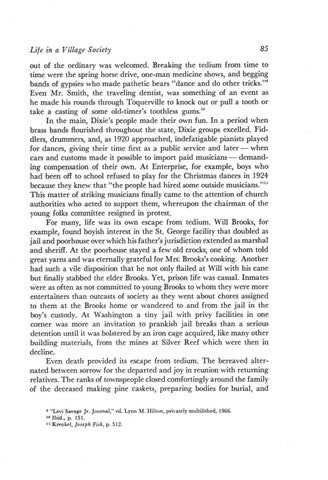Life in a Village Society
85
out of the ordinary was welcomed. Breaking the tedium from time to time were the spring horse drive, one-man medicine shows, and begging bands of gypsies who made pathetic bears "dance and do other tricks."£ Even Mr. Smith, the traveling dentist, was something of an event as he made his rounds through Toquerville to knock out or pull a tooth or take a casting of some old-timer's toothless gums.10 In the main, Dixie's people made their own fun. In a period when brass bands flourished throughout the state, Dixie groups excelled. Fiddlers, drummers, and, as 1920 approached, indefatigable pianists played for dances, giving their time first as a public service and later — when cars and customs made it possible to import paid musicians — demanding compensation of their own. At Enterprise, for example, boys who had been off to school refused to play for the Christmas dances in 1924 because they knew that "the people had hired some outside musicians."11 This matter of striking musicians finally came to the attention of church authorities who acted to support them, whereupon the chairman of the young folks committee resigned in protest. For many, life was its own escape from tedium. Will Brooks, for example, found boyish interest in the St. George facility that doubled as jail and poorhouse over which his father's jurisdiction extended as marshal and sheriff. At the poorhouse stayed a few old crocks, one of whom told great yarns and was eternally grateful for Mrs; Brooks's cooking. Another had such a vile disposition that he not only flailed at Will with his cane but finally stabbed the elder Brooks. Yet, prison life was casual. Inmates were as often as not committed to young Brooks to whom they were more entertainers than outcasts of society as they went about chores assigned to them at the Brooks home or wandered to and from the jail in the boy's custody. At Washington a tiny jail with privy facilities in one corner was more an invitation to prankish jail breaks than a serious detention until it was bolstered by an iron cage acquired, like many other building materials, from the mines at Silver Reef which were then in decline. Even death provided its escape from tedium. The bereaved alternated between sorrow for the departed and joy in reunion with returning relatives. The ranks of townspeople closed comfortingly around the family of the deceased making pine caskets, preparing bodies for burial, and 9
"Levi Savage Jr. Journal," ed. Lynn M. Hilton, privately multilithed, 1966. i« Ibid., p . 151. " Krenkel, Joseph Fish, p. 512.







